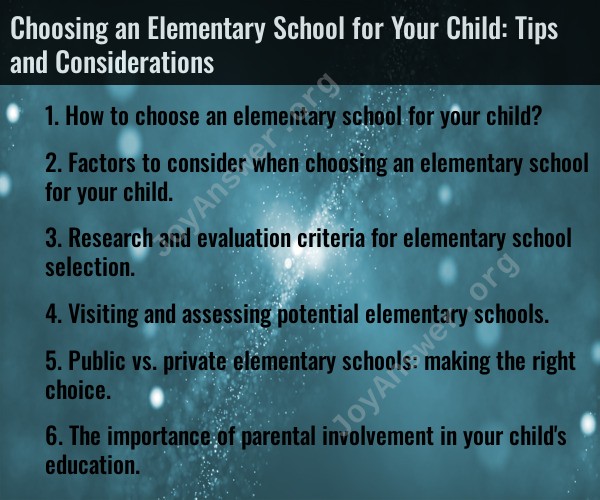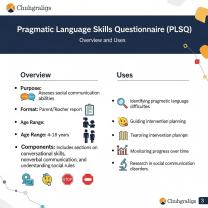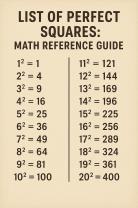How to choose an elementary school for your child?
Choosing an elementary school for your child is an important decision that can have a significant impact on their educational and social development. Here are some tips and considerations to help you make an informed choice:
Start Early: Begin your search well in advance of when your child will start elementary school. This will give you ample time to research and visit schools.
Determine Your Priorities: Before you start your search, make a list of your priorities. What are the most important factors for your family, such as location, school type (public, private, charter), academic programs, extracurricular activities, and values?
Research Schools: Use online resources, school district websites, and recommendations from friends and family to create a list of potential schools. Consider factors like proximity to your home, school reputation, and any specific programs they offer.
Visit Schools: Plan to visit the schools on your list. During these visits, pay attention to the school's environment, safety, cleanliness, and the interaction between teachers and students. Ask questions about class sizes, teaching philosophies, and how the school addresses discipline and bullying.
Attend Open Houses: Many schools hold open houses where you can meet teachers, staff, and other parents. This is a great opportunity to get a sense of the school's culture and ask questions.
Talk to Parents: Connect with other parents, both at the school and in the community. Their insights and experiences can be valuable in making your decision.
Consider Academic Programs: Look at the school's academic offerings and curriculum. Determine if they align with your child's needs and interests. Some schools may have special programs for gifted students or those with specific learning needs.
Extracurricular Activities: Consider the availability of extracurricular activities such as sports, arts, and clubs. These can be important for a well-rounded education.
Teacher Qualifications: Inquire about the qualifications of the teachers, their experience, and the teacher-to-student ratio. Effective teachers play a crucial role in a child's education.
Parental Involvement: Find out if the school encourages parental involvement through events, committees, or volunteering opportunities. Parental involvement can enhance your child's experience and sense of community.
Special Needs Services: If your child has special needs, ensure that the school can provide the necessary support and services, including special education programs.
Safety and Discipline: Inquire about the school's safety measures and discipline policies. You'll want to ensure your child's physical and emotional well-being.
Budget and Cost: If you're considering a private school, be sure to factor in the cost of tuition and any additional fees.
Observe Student Diversity: Consider the level of diversity within the student body, as well as the school's approach to inclusivity and cultural sensitivity.
Trust Your Instincts: Ultimately, trust your instincts and consider what feels like the best fit for your child and your family. Your child's comfort and happiness in the school environment are crucial.
Seek Feedback: Ask for feedback from other parents, both current and former students and parents, to gain more insights into the school's strengths and weaknesses.
Remember that every child is unique, and what works for one child may not work for another. Be open to the possibility of adjusting your criteria to find the best fit for your child's individual needs and preferences.
Factors to consider when choosing an elementary school for your child
Choosing an elementary school for your child is one of the most important decisions you will make as a parent. There are many factors to consider, such as the school's academic reputation, its extracurricular activities, and its overall environment. Here are some of the most important factors to keep in mind:
- Academic reputation: What is the school's academic performance? What are the standardized test scores? What is the graduation rate?
- Extracurricular activities: What extracurricular activities does the school offer? Are there opportunities for your child to participate in sports, clubs, and other activities that they are interested in?
- Overall environment: What is the school's overall environment like? Is it a safe and supportive environment? Do the teachers and staff seem friendly and approachable?
Research and evaluation criteria for elementary school selection
Once you have considered the factors above, you can begin to research and evaluate potential elementary schools. Here are some criteria to keep in mind:
- Academic programs: What academic programs does the school offer? Does the school offer a challenging curriculum that will prepare your child for success in high school and beyond?
- Class size: What is the average class size at the school? Smaller class sizes can provide your child with more individualized attention from the teacher.
- Teacher qualifications: What are the teacher qualifications at the school? Are the teachers certified and experienced?
- Parent involvement: How involved are parents in the school community? Is there a strong parent-teacher association?
Visiting and assessing potential elementary schools
Once you have narrowed down your list of potential elementary schools, you should visit each school in person. This will give you a chance to see the school for yourself and meet with the teachers and staff. Here are some things to look for when you visit a potential elementary school:
- Is the school clean and well-maintained?
- Are the classrooms bright and inviting?
- Do the teachers seem enthusiastic and engaged?
- Do the students seem happy and motivated?
Public vs. private elementary schools: making the right choice
One of the biggest decisions you will need to make is whether to send your child to a public or private elementary school. Public schools are free to attend, while private schools charge tuition. Private schools often have smaller class sizes and offer more specialized programs than public schools. However, public schools offer a wide range of programs and services, and they are accountable to the public.
The importance of parental involvement in your child's education
Parental involvement is essential to a child's success in school. Parents can be involved in their child's education by helping with homework, volunteering in the classroom, and attending school events. Parents can also stay informed about their child's progress by talking to their child's teacher and reviewing their child's grades and test scores.
Choosing the right elementary school for your child is an important decision. By considering the factors above and visiting potential schools, you can make the best decision for your child's education.













